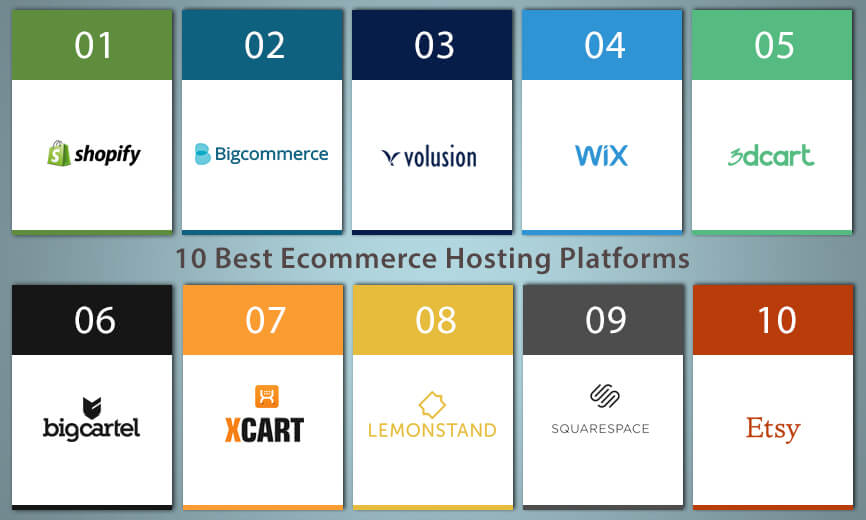
E-commerce hosting platforms are revolutionizing the business world. They are expanding online retail presence and ushering in a new era of commerce. Indeed, they have been game-changers in today’s rapidly evolving business world. Many prospects are involved in successful e-commerce portal development and optimization. These include, for example:
- Developing and enabling advanced payment gateways on the sit
- Present the products under the domain holistically
- Shaping up great-looking web portals
- Managing the product delivery arrangements
- Controlling the B2B dealings meticulously
- Scaling the business by leveraging the internet
The digital market is growing at a flash-like speed. This rapid growth creates numerous opportunities for all business owners, entrepreneurs, and small/medium merchants. Consequently, they can emerge enormously and increase their returns to scale.
To understand how e-commerce hosting platforms economically maximize profit and build their brand, we can examine the top twelve e-commerce hosting platforms. This analysis will show how these platforms significantly impact online businesses.
Table of Contents
12 best-performing eCommerce hosting platforms:
1. Shopline

Shopline empowers small and medium-sized businesses. It allows them to quickly and efficiently create online stores. Furthermore, it offers various tools and features. These tools enable merchants to set up and manage their e-commerce websites without extensive technical knowledge.
Features:
- Shopline has a user-friendly website builder with customizable templates.
- It has multiple tools for managing product listings and stock levels and tracking inventory to avoid overselling.
- You can connect with different payment gateways, ensuring secure and seamless global transactions.
- Multiple marketing tools assist merchants in advertising their products, organizing promotions, and enhancing customer involvement.
2. Webflow

Webflow is designed to meet the needs of diverse users, ranging from designers seeking greater design process control to non-technical individuals and businesses searching for a simple method to create stunning websites.
Features:
- Webflow’s visual editor enables users to design websites by dragging and dropping elements.
- Users can create custom animations and interactions without the need for JavaScript coding.
- Webflow offers a powerful CMS enabling users to manage their website’s content easily.
- Webflow provides hosting for the websites created on its platform, simplifying the deployment process.
3. Shopify

Benefits: This firm’s success stems from several factors. First, it offers many excellent and useful apps. Second, it provides numerous professional themes. However, it also has a neglected and underutilized cart recovery feature that comes at a price. Finally, it offers unlimited products and bandwidth.
Features:
- A proper mobile app to accept payments and manage the eCommerce firm.
- Easily merge the end-to-end needs of the businesses
- POS to handle all transactions
- Help to carry on business
Shopify aims to cater to the needs of small businesses on the internet.
It is considered one of the most popular platforms. Shopify is easy to set up, has faster internet speed, and safe payment gateways. What is more, there are customizable templates for the landing page. In relevance to SEO, it provides customer support for store owners and meta tags.
4. BigCommerce

This one is a popular eCommerce hosting platform and is an online shopping space offing more than any of its peers.
Benefits: The features are a cut above the rest. For example, they include gift cards, 24/7 customer support, and real-time shipping quotes, all at an excellent price. Moreover, the $80 plan offers unlimited products, bandwidth, and storage.
Features:
- Easily merge with eBay, Google Shopping, and more.
- 24/7 round-the-clock assistance
- Google Trusted Store certification assurance
BigCommerce is designed to cater to small and medium retailers. It is identical to Shopify but has many other additives, like advanced features, bandwidth & unlimited storage.
It also has essential eCommerce features that offer reviews & ratings to customers and various marketing tools that give your store a distinct look.
5. Volusion

Volusion is the 2nd biggest e-store after the Yahoo store. It is voluminous as its range spans large numbers transcending it to the leading site among the top 10000 sites.
Benefits: It is the cheapest online space for abandoned recovery carts and can be found at a $15 monthly charge. It is the best site for beginners as it offers all the features peers offer, but is restricted to about one hundred products and 1GB of data usage. Compared to BigCommerce, its Pro plan comes at $75/month.
Features:
- Rewards or an in-built loyalty program
- Built-in Day Deal option
- EBay and Amazon integration
6. Wix

Benefits: It has a brilliant visual design interface and all the facilities that keep the store running. The sales pages are visually attractive; one can design them in any color.
Features:
- The visual editor provided live examples, including template reference
- Reasonable pricing structure and simple interface, perfect for beginners
- No transaction charges, only monthly fees
- Annual charges are as high as 120 dollars.
7. 3DCart/Shift4Shop

It is also a popular site on the web and is quite rich. It boasts of a facility for research of clients by web designers.
Benefits: No transaction fees are charged, which is a big boon. It also boasts of having a mobile back end and front end. It also has been provided with a comprehensive range of related services, such as Facebook or SEO marketing, available in web stores.
Features:
- The option is to sell off the rebranded stores, including an extensive range of permission systems.
- Plenty of shipping choices compared to any of its competitors.
- A plethora of other services are included.
8. Big Cartel

Big Cartel is a smaller company than Shoplift, caters to the needs of indie brands and artists, and is “built for makers.”
Benefits: The price points of Big Cartel are known to be lower and can be compared with Wix and Shopify. There is a free plan offering unlimited features in five products. It is just about $9.99/month that the paid plans start.
Features:
- Caters to small merchants, makers, and artists
- Quick installation as well as integration to sell in person
- Every plan is comprised of incredible integrations and features.
9. Squarespace

Established in 2004, this fully integrated eCommerce solutions provider boasts one million users who speak of the durability of this platform and focus on providing customer satisfaction.
Benefits: It has a rich, visually appealing platform that is perfect for stores requiring rich, beautiful imagery and designer templates for product listings. Both plans offer unlimited products, a significant advantage for any-sized merchant.
Features:
- Advanced and Basic plans have unlimited products.
- Unlimited blogs, galleries, pages, storage, bandwidth, and contributors.
- Site builder offering drag & drop facilities.
10. LemonStand

This platform is relatively newer and comparable to the best options available, like BigCommerce and Shopify. It is highly customizable and lets retailers modify every aspect of the store to create a unique and new online shopping environment.
Benefits: A significant advantage is the usage of off-page and on-page SEO, giving insights into things that can help improve social media perceptions. Moreover, including SSL encryption on every site page is a boon.
Features:
- Customized checkout without any redirection to provide a better shopping cart facility.
- Built-in support is provided for digitized products and offers recurring subscriptions.
- Complete design flexibility, especially over the presentation of content.
Premium plans are available for about $99/ monthly to about $399/ monthly.
11. X-Cart Cloud

t provides users with a range of services. For example, it offers fully managed VPS Hosting from X-Cart, which includes an X-Cart license. This is the hosted feature belonging to X-Cart Downloadable
Benefits: The XCart product is open-source and continuously updated by the team, although updates may be less frequent for the hosted version. A new Cloud Search feature is ready for use, and pricing plans start at $99.95 monthly.
Features:
- Cloud Search, with products appearing instantly after being keyed within the search box.
- Transaction fees are not charged, with well-known alternatives ranging from 0.5% – 2.5% per transaction.
- The POS modules are provided with the Standard Edition.
12. Etsy

Etsy is entirely different. If the desire is to shop vintage goods, handicrafts, and craft supplies, then Etsy is the place to be.
Benefits: Enlisting of products is done in a good-looking manner to woo the audience. It is a good and safe way to start, and happy selling following the guidelines.
Features:
- It offers immense opportunities to help establish the brand.
- Currently, Etsy boasts of having more than 30 million users to access to sell your products.
- Plenty of social interactions, along with professional design.
Each listed item will be a one-time charge of $0.20 and an additional 3.5% per transaction.
So, what makes an eCommerce hosting platform a success?
The solution lies in a standard feature that keeps resonating in the ears. For instance, it’s reasonable to charge justified fees for a secure and visually appealing platform that generates significant sales and offers valuable tools to boost market shares.
Entrepreneurs look for the right mix of all the marketing parameters that make a cocktail of earning big profits in the web portals hosted by eCommerce platforms.
Technology is a great leveler. Tech stacks like digital marketing, web designing, SEO, and application of technology are the key prospects that define the game’s rules and create waves in eCommerce.
Final Words
Today, Flipkart, Myntra, and Amazon are excellent eCommerce development firms with multi-crore valuations. They have become popular and a part of everyone’s shopping sites.
In the post-2010s, the eCommerce industry experienced significant growth with the widespread availability of eCommerce hosting platforms. However, several news outlets suggest that the eCommerce bubble may have burst. It remains to be seen whether businesses operating in this space will experience gains or losses and whether B2C and B2B businesses of this type will ultimately succeed.
AboutManthan Bhavsar
Related Posts
Why Should You Choose Metizsoft Solutions As A Shopify Agency? What Makes Us Special?
Shopify is one of the most popular eCommerce platforms today. Its immense popularity and great features have made it a...
From Startup to Style Icon: How to Build a Winning Fashion Brand in 2026
From Startup to Style Icon: How to Build a Winning Fashion Brand in 2026
If you are running a mid-scale fashion brand or someone who’s thinking, “How to sell products online” or...
